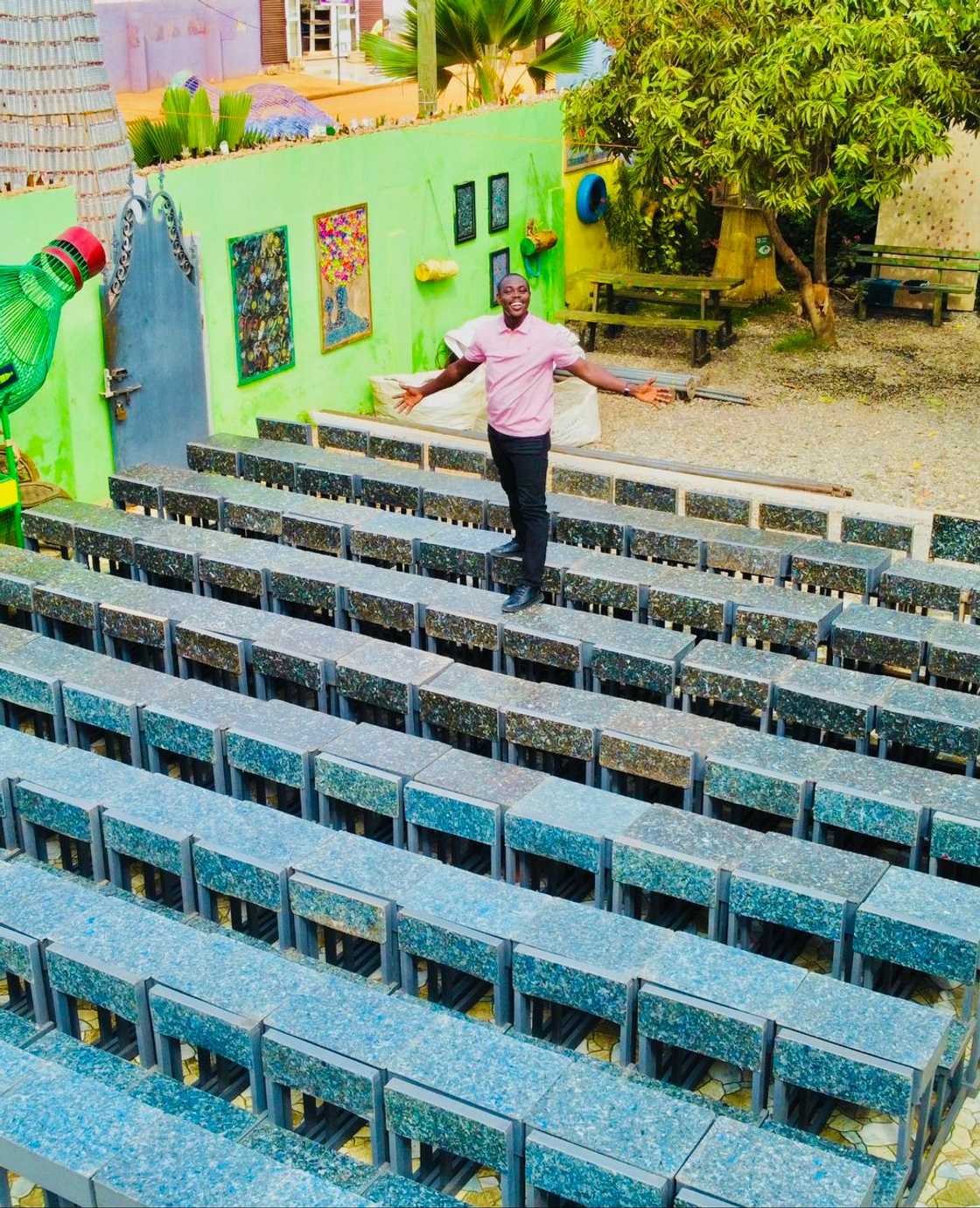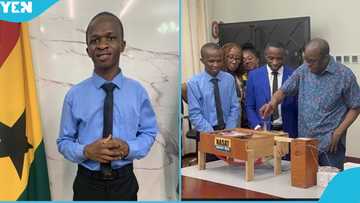Makafui Awuku: Meet the Ghanaian Innovator Making Roofing Sheets From Recycled Plastic Waste
- A Ghanaian man, in his quest to play a role in dealing with the country's plastic problem, has spearheaded efforts to turn these materials into essential products
Ghana has faced an uphill challenge for years in tackling plastic waste, which has become a heavy burden for the citizens and successive governments.
The country reportedly generates around 1.1 million tons of plastic waste per year.

Source: Facebook
According to a report by the Global Plastic Partnership Action, only five per cent of this waste is collected for recycling.
The Ministry for Environment, in a 2020 report, disclosed that a strong recycling industry in Ghana could recover nearly one million tonnes of waste plastics from the environment and landfills annually.
The report then added that the country, by recycling plastic waste into basic products, could generate GH¢2 billion each year and create 5 million jobs nationwide.
In the midst of all this, one Ghanaian man has taken it upon himself to combat plastic waste by converting what many see as rubbish into essential products.
Speaking in an exclusive interview with YEN.com.gh, Makafui Awuku, the founder and CEO of Mckingtorch Africa, said his personal struggles were a driving force that urged him to set up his company.
"I was inspired to come up with the innovation due to my struggles with asthma, which is aggravated by air pollution partly from the burning of plastic waste."

Source: Facebook
In furtherance of his ambition, he opened a workshop at Adenta in Accra, where he processes plastic waste into essential products such as roofing sheets.
The company, which has a staff capacity of 15 direct workers and 500 volunteers, uses segregated, non-contaminated plastic waste. These materials are collected from hotels, schools, restaurants, churches, and communities.
"We collect the plastic waste from hotels, schools, restaurants, churches, and communities through our innovative plastic waste receptacles. We only use segregated non-contaminated plastic waste to reduce the use of water and save costs on processing while providing sustainable income for women who collect the waste and also work with us."
Ghanaian's challenges in recycling plastic waste
Makafui Awuku, on behalf of the company, pointed out the difficulties encountered when it comes to plastic waste recycling in the country.
First, he explained that setting up the company to recycle plastic waste was difficult because it demanded substantial funds and years of experimentation.
Moreover, he disclosed that Ghanaians had not embraced the idea of reusing plastic waste and needed to be enlightened on the relevance of this initiative.
"There are a lot of challenges in setting up and running such a project. It’s been several years of experiments and required a lot of money, which has not been easy to come by as funding for circular economy and environmental sustainability projects has been hard to find.
"Up until 2019, Ghana did not have a plastic waste management policy, which also meant there was no enabling environment to support innovations being done by us. There was also the challenge of acceptance, as Ghanaians believe waste is meant for landfills and found it difficult to accept the new life we were giving to waste. Additionally, there was a knowledge gap, which meant I had to develop training modules and empower others to work with me."
Current achievements in recycling Ghana's plastic waste
Since its humble inception, the company has made some strides worthy of mention.
Top of the list is the recent production of 200 desks from plastic waste, which are being distributed to schools in Accra.
Makafui Awuku also opened up about his ambition to raise $1 million to build a large factory and create over 500 jobs.
"We just finished the production of 200 desks, which have started going to schools in Accra. We also have a roofing sheets innovation which we are testing by building a shed from it. We have a footwear brand, tables, benches, trays, and other products we are working on. I am currently hoping to raise 1 million dollars to build a big factory and create at least 500 jobs for women and the youth, recover millions of tons of waste, and tackle the close-to-2 million desk deficit problem in Ghana."
He also opened up on his desire for more Ghanaians to adopt innovative ways to solve the country's plastic waste problem.
"My most fulfilling experience is my desks ending up in classrooms and students using them. Innovation is the only solution to the pollution problem. If we can turn waste into raw materials that can last for decades and develop the value chain to make it accessible for production, the problem will go away while we create jobs."
Engineer converts plastic waste into fuel
Earlier, YEN.com.gh reported that a Ghanaian engineering student has converted discarded plastics such as bags and water sachets into petrol, diesel, and grease.
Sumani Adams created this project to convert plastic waste to help solve a national menace and also reduce the amount ending up in landfills and the environment.
Proofreading by Bruce Douglas, copy editor at YEN.com.gh.
Source: YEN.com.gh





